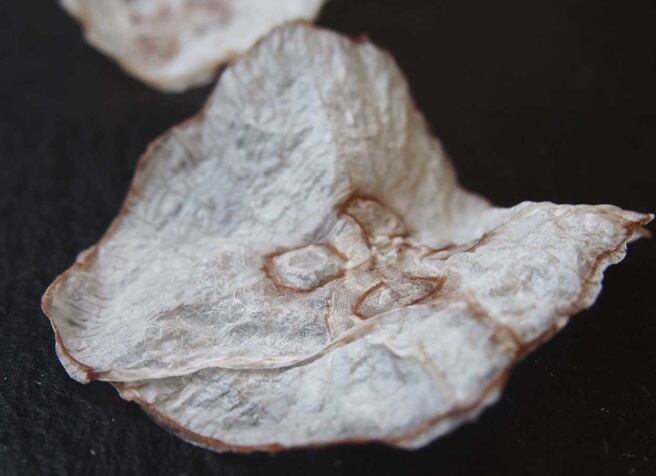The scientists presented the results of their study at the 62nd Biophysical Society Annual Meeting held in San Francisco, California, last month.
They concluded jellyfish chips could also be of potential gastronomic interest, but the texture needs refining to create worldwide appeal.
Asian delicacy
Jellyfish are widely eaten in Asia, by typically marinating the bell (or body) in salt and potassium alum for several weeks to produce a pickle-like texture.
However, the Western palate is unaccustomed to this food source and the jellyfish is often described as “slimy” and “tasteless”.
Nevertheless, they do tick many boxes when it comes to being a sustainable food source and highly nutritious.
Due to overfishing and climate change, fishing stocks are rapidly diminishing, so turning to the booming jellyfish population for consumption makes sense. In fact, climate change is making the oceans more acidic, a perfect environment for jellyfish to reproduce more quickly.
In addition, according to the Food and Agriculture Organization (FAO), we could see “a global regime shift from a fish to a jellyfish ocean” within our lifetimes, so eating more jellyfish is just one more way to keep their numbers lower.
Jellyfish are also rich in rich in vitamin B12, magnesium, phosphorus, iron and selenium.A crunchy preference
The researchers noted texture plays a large factor when it comes to food appeal, so set about turning the jellyfish into a crispy chip to make it more appetizing.
“When we eat, we need to be stimulated in many ways with our senses. And one of the sense we like to be stimulated is our touch sensation in our mouth,” said Mathias P. Clausen, a postdoctoral fellow at University of Southern Denmark.
“If we eat a potato chip we need it to be crispy and not soft, even though the taste … is the same, but just the fact that it’s soft means that it’s not appealing to us.”
Transformation within days

To achieve this, the scientists examined microscopic studies to understand how the long, thin tubes of cross-linked collagen that make up a jellyfish’s body change from a soft, rubbery texture into a hard and crunchy product during the preservation method.
They found that, by submerging moon jellyfish (Aurelia aurita) in a solution of 96% ethanol sped up preparation rapidly.
Compared to a salt/alum preparation over the course of a 40-day period, the jellyfish submerged in ethanol lost so much mass they turned into a paper-thin wafer – almost like a potato chip.
Further studies found jellies left in chilled ethanol for two to three days, then left overnight at room temperature, had the same desirable texture as the same species left in salt and alum for 20 days, and dried over the course of two weeks – a time saving of almost 90%.
“By transferring the alcohol, we can basically remove all of the water in the jellyfish and then that means we have only the dry matter left,” said Clausen.
“This turns out to have a crispy structure and forms a very dense network.”
New generation of snacks
The novel method, suggested the researchers, could give rise to a new generation of aquatic snacks.
The application of ethanol instead of deep-frying in oil keeps the snack low in calories, making it an acceptable alternative to potato chips.
According to Clausen, after the initial crunch, the jellyfish disintegrate, leaving just a hint of the sea in the mouth.
Study:
‘The Microscopic Structure of Crunchy and Crispy Jellyfish’
Authors Mie T. Pedersen, Morten Christensen, Lars Duelund, Per L. Hansen, Jonathan R. Brewer, Mathias P. Clausen
62nd Biophysical Society Annual Meeting

